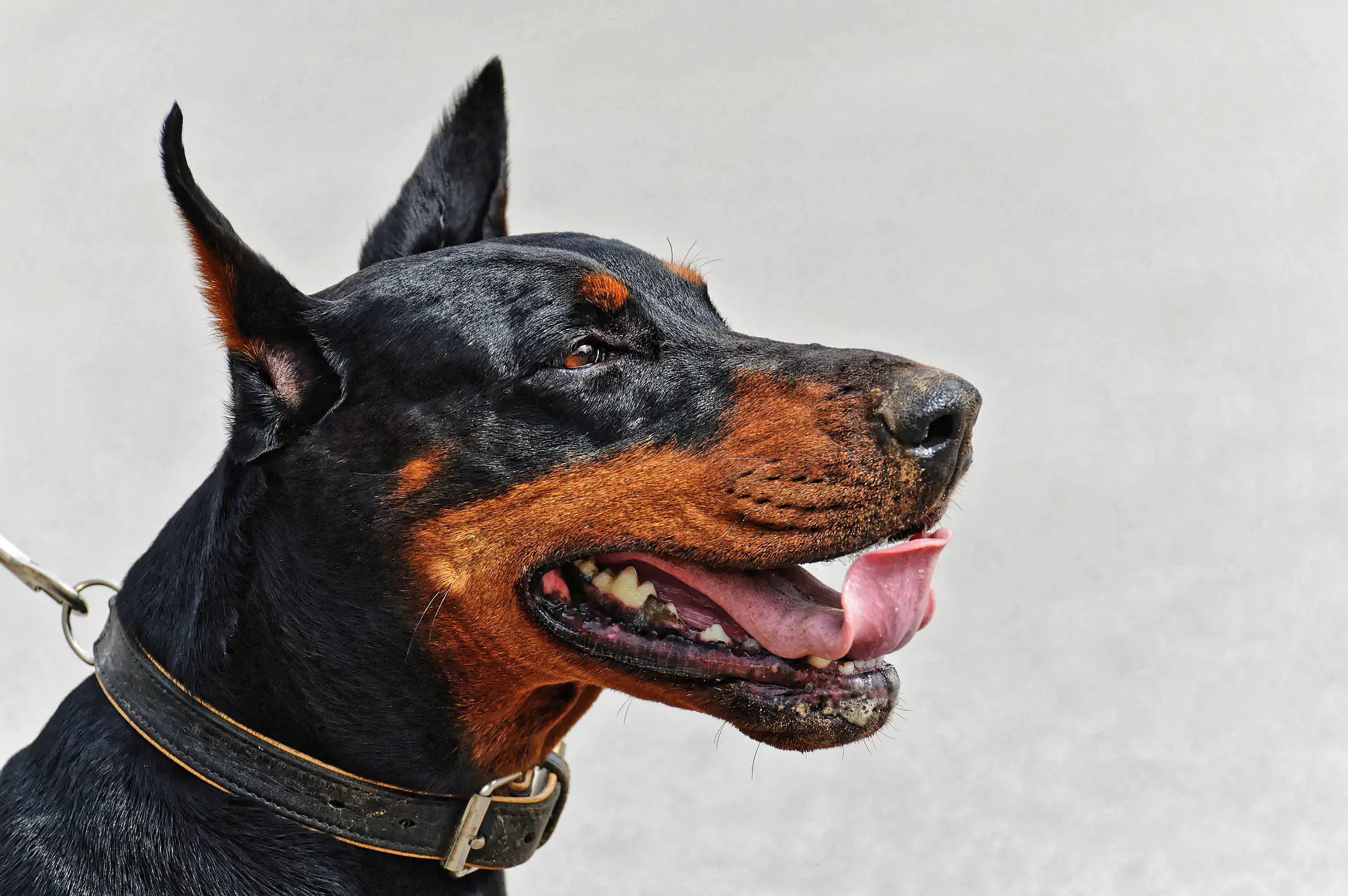Dobermans are a beautiful and agile breed with a shiny black and rust-colored coat. They have an alert, upright and dominant stance with a shoulder height of around 67cm.
Dobermans are praised for their obedience and loyalty while their fierce instincts may make some people more hesitant to approach them. They are part guard-dog and part family-dog and are bred with specific temperaments in mind. In this article, we will be looking at the advantages and disadvantages of Dobermans.
This highly intelligent breed comes with a hefty price tag and at almost $2,000 you might want to make extra sure that your lifestyle is suited to the needs of this active dog. Dobermans have a lot going for them as they are easy to groom and train but they have considerable health issues and are prone to behavioral problems if they are misunderstood. Take a look at the pros and cons you face when bringing a Doberman into your home.
Pros of Owning a Doberman
1. Incredible protection dog
The main breeding purpose for Dobermans was for personal protection. For more than a hundred years, they have been keeping their owners safe whether it be with their fearsome looks or brute strength. They have an instinct to protect their owner and will therefore always be close to your side, an important pro of Dobermans. It gives owners some peace of mind to know that their dog is always looking out for them and their family.
Naturally, your dog will need lots of training and constant stimulation to successfully fulfill this purpose. They are quick and agile that makes them perfect for catching up to intruders. Because of their athleticism, they are often trained as police dogs or for work in the military.
2. Highly Trainable
Dobermans are constantly ranked under the world’s top 5 smartest dogs, a pro of Dobermans. This makes them highly trainable and they can perform advanced tasks in a flash. They can learn an astounding number of commands, some say as many as 50. These commands don’t necessarily need to be of practical use but will keep your dog stimulated and alert.
It is worth noting that the first year of your puppy’s life might be spent learning less advanced commands. Basics such as “sit” and “stay” will be what you are aiming for. After they enter adolescence, they will be more demure and able to learn more specialized commands and signals.
3. Perfect family dogs
Dobermans are great with kids, despite their fierce reputation. They are gentle and patient and have shown a high tolerance for children. If they are raised with other pets in the house they are also very sociable around them.
It is a common misconception that big dogs need to live outside. Dobermans thrive when living in a house where they can follow you around and stand by your side as much as possible. They do, however, need a yard for a trot outside every now and then. Because they enjoy being indoors so much, it is very important to keep a diligent exercise routine to cope with all their pent up energy.
Cons of Owning a Doberman
1. “Cropping and Docking” practices
“Cropping and Docking” are highly controversial practices that are still performed in the USA (it has been outlawed in the EU). This involved the ears of the puppy being snipped and trimmed to be permanently upright a few weeks after birth. The same goes for their tail. Their tails are high set and curve upward but are docked between 3-5 days after birth. Making these decisions can be difficult and will have a lasting impact on your dog one way or the other.
The high-set whip-like tail of a Doberman does run the risk of getting severely damaged as the dog grows up. Dobermans wag their tails uncontrollably and often their tails break upon impacting hard objects. This can cause a lot of trauma and pain for the dog and ultimately, amputation might be needed. Amputations in the later stages of a dog’s life are significantly more painful than docking at birth when nerve endings have not yet fully developed. As for their ears, dogs with floppy ears are more prone to ear infections than dogs with upright ears.
Both of these are tough choices to make and you will need to carefully consider your ethical standpoint on the matter before committing to a Doberman.
2. “Aggressive Dog” policies
No thanks to Hollywood and the mainstream media, Dobermans have a reputation as being fierce, aggressive dogs. Though they are bread for protection, they don’t pose a danger to people when they are trained well.
Unfortunately, some insurance policies will not cover you if you own a Doberman as they are included in many “Dangerous Dogs” lists, a con of owning a Doberman. Some municipalities have outlawed these kinds of dogs and your homeowner’s association might also be opposed. The Doberman is associated with other potentially dangerous breeds such as the Pitt Bull or German Shepherd.
Apart from bureaucratic drawbacks, it will also be difficult to persuade friends and family to be comfortable around your dog. Ideally, you would want a dog that can be sociable with people in your home but a Doberman’s watchful eye on its owner can be intimidating.
3. Very attached to their owner
Some might see it as a “pro” to have a highly attached dog. It is all good and well when you are home but once you leave home, your dog will easily become anxious and distressed. They will demand constant attention and won’t hesitate to force themselves into your space to acquire it. If you can’t cope with such an “in your face” approach, a Doberman might not be for you.
Dobermans are known to attach to one owner. Even if they are part of a family, one person will stick out as the dog’s main owner. They will cling to you like Velcro and tend to be more obedient towards you if they have singled you out. Separation anxiety can be a destructive force in your relationship with your dog. Your dog could become aggressive, damage your property, bark excessively or disregard their potty training.
4. Not suitable for a first-time owner.
These dogs need authority at home and a strong leader to control them. Dobermans will also require a lot of mental stimulation above the physical demands they pose. Because of this, first-time dog owners might underestimate the amount of energy and time that will they will need to invest in this dog, especially during their puppy stage. Thus, a disadvantage of Dobermans is that they are not suitable for first-time dog owners.
They are a high-energy breed and simply letting them play in the yard won’t be sufficient. They require extensive daily exercise that is best suited for someone that leads a particularly active lifestyle.
I hope that this article on pros and cons of Dobermans was helpful. If you are interested, visit the Dog Category!

